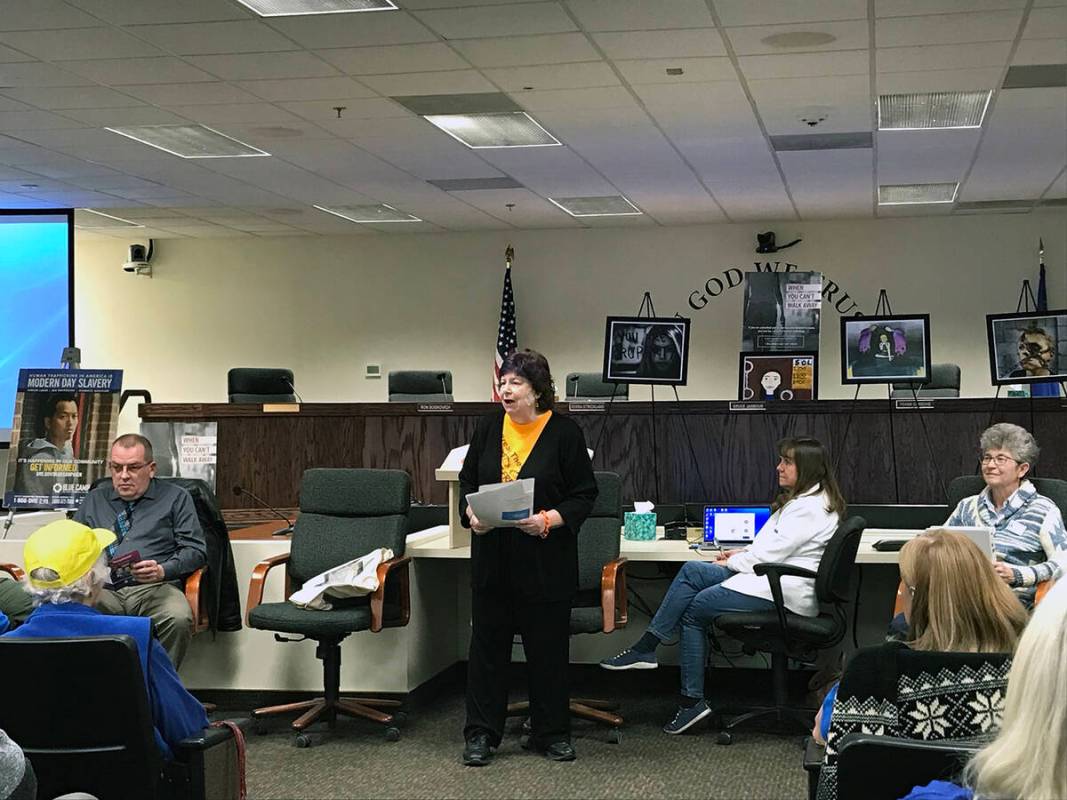
Human trafficking is a stark reality of life, with millions of victims — both adults and children — forced into labor, sexual encounters and marriage each year. Their stories are never pleasant and they often end in tragedy.
Though it can be a difficult, uncomfortable thing to discuss this global problem, the women of Soroptimist International are not shying away from the topic. This month, the nonprofit organization’s Pahrump Valley chapter hosted a Human Trafficking Awareness Community Forum to help spread the word about modern-day slavery and what the general public can do to help stop it.
Soroptimist Elaine Cassell welcomed the audience to the Jan. 21 forum, opening the event with the remark, “Human trafficking is everywhere. Yes, it can be in the small towns, not just in the big cities.” Cassell then introduced the first speaker of the afternoon, former Nevada Supreme Court Justice Nancy Becker.
A longtime Soroptimist, Becker is also the founder of Break These Chains – Live Free, an initiative geared toward placing human trafficking squarely in the public’s eye.
“Human trafficking is recruiting and exploiting the labor or services of another through force, fraud or coercion. And whether or not coercion is used, all minors in the sex trade are victims of trafficking,” Becker stated. Underscoring the fact that human trafficking touches all walks of life, she continued, “It goes beyond nationality, gender, race, class, schooling, culture, age.”
She explained that the “in-your-face” approach taken by Break These Chains is intended to make it impossible for people to ignore the issue of human trafficking.
“Our purpose is to raise awareness using both traditional means and nontraditional ones,” Becker said. “Among the nontraditional are what is called performance art – plays, dances, songs. Things that might get people interested, it’s kind of the hook, and then you feed them a little bit about the issue and where they can go to learn more.”
As an example, Becker played a video of a news report on one of Break These Chains’ events on Fremont Street in Las Vegas, where a flash dance attracted coverage that went nationwide. Break These Chains has also hosted art contests in which students create pieces depicting the harsh realities of human trafficking, some of which were on display at the event that afternoon. Those pieces were sobering to look at but it is that very shock factor, she said, that can inspire interest in the issue. That is why nontraditional methods of raising awareness are so important, she added.
Next to speak were two officers from the Nye County Sheriff’s Office, Det. Michael Eisenloffel and Sgt. Joseph Marshall. Both have had firsthand experience with human trafficking, specifically of the sexual variety. As part of their duties with the office, the two have participated in the Internet Crimes Against Children Task Force and have witnessed some truly horrendous situations over the years. They related just a few of their past experiences and their words were received with a palpable sense of disquiet by those assembled.
Marshall, who is still involved in investigating such crimes, poses as a child on social media in an attempt to lure potential offenders.
“One of the things I have learned is, it is very real in our community,” Marshall remarked.
He noted one instance in which a man had traveled in Pahrump to meet with what he believed was a young girl and when he was arrested, his vehicle was impounded. That vehicle was primed for more than just a sexual encounter with a child however. It was rigged so that only the driver’s door would open and prepared with a bed in the back seat, a knife and alcohol.
“I am positive that what he was going to do was kidnap me and take me away and I would have never seen Pahrump again. Luckily he met me and not an actual 13-year-old,” Marshall stated.
Fifth Judicial District Judge Kim Wanker, another speaker for the community forum, added that while kidnapping is a factor in human trafficking, people may be surprised to learn that most trafficking crimes do not involve kidnapping and in fact are often committed by people the victim is already familiar with or those they have met and become friendly with online.
“Awareness is important, participation is important, by the community, by parents, grandparents, family members, friends,” Eisenloffel urged. “Law enforcement can only be in so many places, there are only so many of us and we only have so much time to investigate everything we have in front of us, beyond just sex trafficking. So we need the help of the community.”
To report suspected human trafficking call the U.S. Department of Homeland Security’s tip line at 866-347-2423.
Anyone who is experiencing human trafficking is urged to call the National Human Trafficking Hotline at 888-373-7888.
To learn more about the issue visit www.DHS.gov/Blue-Campaign
Contact reporter Robin Hebrock at rhebrock@pvtimes.com